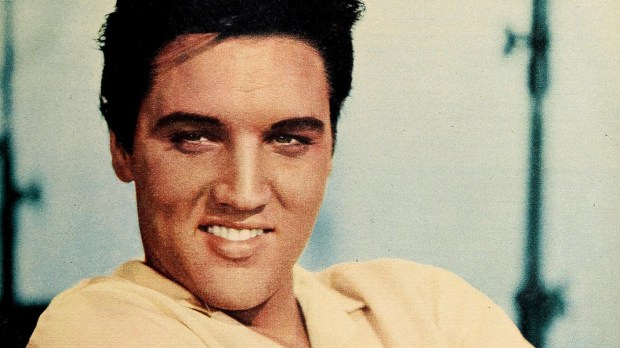Lenten Campaign 2025
This content is free of charge, as are all our articles.
Support us with a donation that is tax-deductible and enable us to continue to reach millions of readers.
The king is dead. Long live the king.
More than 40 years after his death, millions still revere the King of Rock and Roll. They play his music, sing his songs, dive into bad impressions of the man. Millennials born decades after he died (Aug. 16, 1977 at the age of 42) may not know “Heartbreak Hotel” or “Hound Dog,” but they know his name. Even after all this time, culture is still on a first-name basis with Elvis.
But for all his No. 1 singles (18, including 11 in a row), all his hit albums (14 have been certified either gold or platinum), and all his obvious influence on popular music, Elvis Presley’s life and legacy is complex — particularly in terms of his Christian faith, which he claimed adherence to but didn’t always follow very well.
“I read many biographies by those closest to him who said Elvis was always conflicted with God,” says Mark Macias, who wrote The King: The Final Hours, an upcoming play that speculates what Elvis’ last moments on earth might’ve looked like. “He wanted to give his talent to God but the world was too tempting to resist.”
Elvis’ relationship with God began early. He and his family attended the east Tupelo, Mississippi, First Assembly of God Church. He was baptized twice as a child — once in Tupelo, and again as a teen by a Oneness Pentecostal pastor in Memphis. (He was baptized yet a third time, this time posthumously, by the Church of Jesus Christ of Latter-day Saints.) By all accounts, he was deeply religious.
“I believe in the Bible,” he once said. “I believe that all good things come from God. I don’t believe I’d sing the way I do if God hadn’t wanted me to.”
For Elvis, Christianity and music were intimately entwined from the very beginning of his life. His mother, Gladys, says (in a story repeated by Beliefnet.com) that even as a toddler, Elvis would wriggle out of her lap during services, dash to the front of the church and watch the choir sing, sometimes imitating the choir’s moves.
Lisa Marie Presley, Elvis’ daughter, says that gospel was “no question” his favorite genre. “He seemed to be at his most passionate and at peace while singing gospel,” she wrote in the liner notes for No One Stands Alone, an album of Elvis’ gospel recordings released earlier this month. And in the 1972 documentary Elvis On Tour, Elvis says that even then — in his career’s latter stages — gospel was a constant source of solace. “We do two shows a night for five weeks [in Las Vegas],” he said. “A lotta times we’ll go upstairs and sing until daylight — gospel songs. We grew up with it. It more or less puts your mind at ease. It does mine.”
Macias says that he grew up loving Elvis, and that his gospel songs formed part of the soundtrack of his childhood. “There’s a famous story about Elvis recording a gospel album,” Macias says. “When it was over, he was in tears and everyone in the room was moved. Elvis later told everyone he could feel God directly when he performed those gospel songs for God.”
But while gospel music was a huge, enduring part of Elvis’ life, the Gospel message sometimes got lost in the shuffle.
Writing for The Gospel Music Magazine, Cheryl Thurber described Elvis as a “spiritual seeker.” And while Elvis brought the Bible with him everywhere, he read The Autobiography of a Yoga and The Prophet, too. In Peter Guralnick’s book Careless Love: The Unmaking of Elvis Presley, his last few months were spent largely in seclusion — his only company an array of spiritualism books.
“All I want is to know the truth, to know and experience God,” he once said according to Christian Today. “I’m a searcher, that’s what I’m all about.”
But even the most sincere searches can get sidetracked. Fame and fortune can be a detriment to faith. Elvis, who was born in a two-room house in Tupelo, was given access to countless temptations during his oversize career. We know, sadly, where those temptations led: By the time he died, he was grossly overweight and abusing an array of drugs.
“Isolation brings on drug abuse,” says the late Tom Petty in HBO’s two-part biography, Elvis Presley: The Searcher. “It had to be very lonely, we know that. There’s a point when you have success and you get really wealthy, and there’s the day the letter comes that says none of this will make you happy. He knew he had to find something, but I think he gave up.”
But Macias speculates that, in his last hours, Elvis returned to faith — a return chronicled in his play (which will begin a limited preview run at The Producers Club Theatre Oct. 17).
“I think in Elvis Presley’s final hours he asked God to forgive him,” he says. “He knew he made mistakes in life and regretted some of the choices he made. During his final hours, we do know that Elvis went to his piano and played gospel songs. I doubt he played gospel songs on his piano every night, so does that act give us any indication that Elvis was calling out to God? I believe it does.”
“Most artists are sensitive,” Macias continues. “It’s how we create. We go deep inside ourselves and feel. Elvis was a great artist and singer because he knew how to go deep into his spirit and connect with a higher power. Personally, I think he learned that in church as a boy and it never left him.”
Read more:
WATCH: Elvis Presley sings the “Hail Mary”

